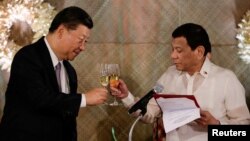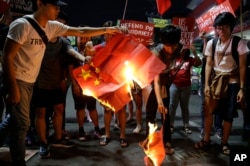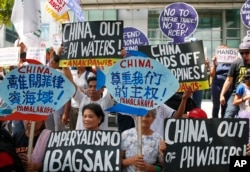A maritime energy exploration agreement is being seen by some as an attempt to continue improving relations between China and the Philippines, countries once so opposed that their rift over maritime sovereignty went to a world arbitration court.
Philippine and Chinese officials inked a memorandum of understanding Nov. 20 to look together for oil or gas under the South China Sea. The two countries contest sovereignty over parts of the sea, leading the Philippines to file for arbitration and win its case against China in 2016.
Over the past two years, China has extended economic aid to the relatively poor Philippines. Philippine President Rodrigo Duterte in turn set aside the sovereignty dispute, saying there’s no way his country could win a war with China.
But the Philippine government says it will accept no less than 60 percent of any joint fossil fuel discoveries, and China is expected to comply as a way of building stronger ties with a still skeptical Philippine public.
“Joint exploration demonstrates at least superficially on the Chinese side that they are trying to engage in diplomacy and to build bilateral relations through various kinds of joint activities, so I think that’s a win for China diplomatically,” said Stephen Nagy, senior associate politics and international studies professor at International Christian University in Tokyo.
Memorandum of understanding
The two countries inked their exploration pact as one of 29 agreements signed during a state visit to the Philippines by Chinese President Xi Jinping. It calls for establishing a joint steering committee as well as at least one working group with representatives from each side’s major oil drillers. The committee will negotiate more precise deals on where to look for fuel.
The memorandum does not specify where the two sides would explore — some locations are more sensitive than others — or who would take how much of any fuel discovered.
“Nothing has been really set in stone with respect to the respective oil and gas joint development at this point,” said Jay Batongbacal, a University of the Philippines international maritime affairs professor. “The agreement literally is merely a framework for the two countries to continue negotiating specific agreements on oil and gas exploration, so actually the substantial part of it is probably going to come much later.”
Specific agreements may be hard to reach, he said, because the Philippine constitution and other laws limit joint work in certain tracts of sea. Some Filipinos worry that a more detailed deal could concede Philippine sovereignty to China.
Brunei, Malaysia, Taiwan and Vietnam also claim all or parts of the sea. All claimants prize the waterway for its fisheries, marine shipping lanes and the prospect of energy under the seabed. Some have explored jointly for oil before in the contested tracts.
In 2012 Chinese vessels pushed Filipino fishing boats out of the tiny South China Sea islet of Scarborough Shoal, which is west of the Philippine island Luzon. The incident led to world court arbitration case.
Something for both sides
The Philippine foreign minister was quoted saying earlier this year that China was willing to take a minority stake in any joint oil or gas discoveries.
Even if later deals are hard to reach or no one finds fuel, the 60-40 concession would help Beijing deepen its friendship with the Philippines, analysts say.
“I think this is one way of signaling that China is willing to be a different kind of aid giver,” said Alan Chong, associate professor at the S. Rajaratnam School of International Studies in Singapore.
Today many Filipinos — more accustomed to strong Manila-Washington relations — remain leery of tie-ups with a country that disputes sovereignty with their own. Some wonder too whether Beijing’s billions of dollars in of economic aid pledges over the past two years will materialize or, conversely, leave their country indebted to China.
Oil exploration has been “politicized,” said Christian de Guzman, vice president and senior credit officer with Moody’s in Singapore. But he expects state-to-state ties will improve anyway through Duterte’s term into 2022.
“It is quite clear that for the duration of the Duterte administration that the tensions vis-a-vis China have eased,” he said.
The Philippines also seeks new sources of oil and gas to avoid paying the rising prices of imported fuel, a contributor to inflation since August. Both China and the Philippines are looking for fuel elsewhere in the sea, but the Philippines leans heavily on foreign contracts to cover gaps in funding and expertise.
China will probably kick in most of the money and expertise for joint projects, given its wealth of experience, experts expect.
The joint effort would give Beijing access to valuable data on sea currents and underwater topography, Nagy said. It can use that data, he said, to develop submarine warfare.
Over the past decade, China has riled the other maritime claimants, including the Philippines, by landfilling tiny islets throughout the sea and militarizing some.







